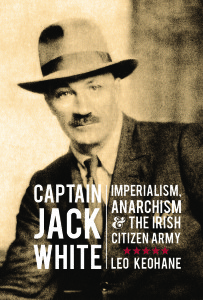Reviewer: Wouter van Dijk
Captain Jack White. Imperialism, Anarchism and the Irish Citizen Army, Leo Keohane
Merrion Press (imprint of Irish Academic Press), Sallins 2014
ISBN: 978-1-908928-92-4
Paperback, illustrations in black and white, notes, bibliography and index
283 pages
€22,50
The life of an Irish misfit
In the historiography of the Irish revolutionary period, roughly between 1913 and 1923, the figure of one of the key founders of the nowadays well-known Irish Citizen Army has somehow always remained in the dark. At last, now the centenary of the 1916 Easter Rising is approaching rapidly in all its pomp dr. Leo Keohane sheds some light on this remarkable figure, who played his part in several important movements during this watershed period in Irish history. Captain Jack White DSO (1879-1946) fought in the Second Anglo-Boer War under the flag of the British Empire advancing the height of its power, was instrumental in establishing and training the Irish Citizen Army during the Dublin Lock-out of 1913, was involved in the Irish Volunteer movement, and later on left for Spain to assist the Republic in its struggle for survival against encroaching fascism.
The author, Leo Keohane, is specialized in political philosophy and theory, Anarchism in particular. His PhD-thesis also focused on Jack White and his relationship with Anarchism, as White was one of the few self-proclaimed anarchists of some standing in Irish history. Jack White truly is a fascinating person because he represents a completely different early twentieth-century Ireland than has taken root in collective memory. Keohane’s book more or less follows White’s life chronologically, but now and then he interferes with expositions about White’s developing political thinking and puts this against the background of the turbulent political Irish landscape of the time. White’s drift toward anarchism can be seen as quite unusual since he was born in the upper class of society, in a family of landowners in County Antrim. His father was George White, a high officer in the British army and the later ‘hero of Ladysmith’. But even so, an even wealthier background had not held Pjotr Kropotkin from developing unusual political ideas either. Anecdotes from his family and his autobiography Misfit tell us that Jack had always been obstinate, since childhood. For the treatment of White’s childhood Keohane seems to rely very heavily on the man’s biography Misfit due to a lack of sources for White’s early years. However, maybe future research can lighten up this period of White’s life somewhat more.
In the memories of his Boer War service the first traces can be found of White’s anti-imperialistic thinking. The systematic destruction of the lands of the Boers and the blind obedience that was expected from British troops left their traces in the mind of the young man. After leaving Africa he embarked on unsuccessful adventures in Canada, where he tried to live an ascetic life in the Tolstoyan fashion, and in England where he lived in a commune for some time, White appeared on the political platform for the first time in 1912. In October 1913 he already was a speaker of some renown when he shared the stage with Sir Roger Casement and Alice Stopford Green. His sympathy for the Irish cause cannot be seen in a conventional way as in the case of for example Casement, Pearse or Clarke. White didn’t see any struggle as strictly ‘national’; he rather tended to look at them as examples of the omnipresent struggle against authoritarianism. Therefore his siding with the Connolly, Larkin and the working-class during the Dublin Lock-Out in 1913 can be no surprise. Having become a staunch supporter of Connolly, White explains the latter’s allying with the Volunteers as a means to succeed in establishing a socialist democratic republic in Ireland.
White always chose to fight injustice and to support the weak. For a while his idea of a just cause and the Nationalists’ fight for an independent Ireland ran parallel, but when the old British elite was replaced by a new Irish one that was just as conservative and unwilling for social change, and while the fight against the Empire turned into civil war, he definitively turned away from the Nationalist movement. Besides his socialist ideas, White also developed a strong sense of pacifism. This showed itself, paradoxally enough, also in his organization of the Irish Citizen Army. This was, after all, established to protect striking laborers against excessive police violence. During the First World War, White transforms his personal car into an ambulance to assist the Allies on the Western Front. In the 1930’s, he would do the same in the Spanish Civil War on behalf of the Spanish Republic. It was in 1936 Barcelona his finally came to terms with his political theories as anarchistic. Considering himself also a conscientious Christian, White tries in the interwar period to get support for his political aims of establishing in both the North and South of Ireland a form of Christian Communism but remains, not very surprisingly, a loner in the Irish political landscape. During the Second World War White remains in Ireland campaigning for a joint war effort in North and South Ireland to support the Allies in winning the war ‘for individual freedom’. In 1945 he is told that he is suffering from cancer and having played a role in almost all great political conflicts of his time, dies in February 1946.
Keohane’s vivid account of Jack White’s life deserves to be praised because of the long-awaited attention it generates for this remarkable figure from Irish history. That White remains an intriguing personality even today lies for a great part in the fact that he never allowed himself to be lend for one cause completely, he always remained his own man. Also, it is valuable to remember him as an example of another side of Irish history in those turbulent years. Not a land of Protestants against Catholics, Unionists against Nationalists or even Treatyites against anti-Treatyites, but of a much more complicated society and political fragmented scene than normally is considered. With his paper memorial to this man Leo Keohane has done an excellent job. Although White’s private life could have been more elaborately treated, the fact remains this is an excellent account of White’s public life. To anyone interested in Ireland’s eventful years at the beginning of the twentieth century the message may be clear: read this book!
Wouter van Dijk

Pingback:
Michael Mallin, Brian Hughes |